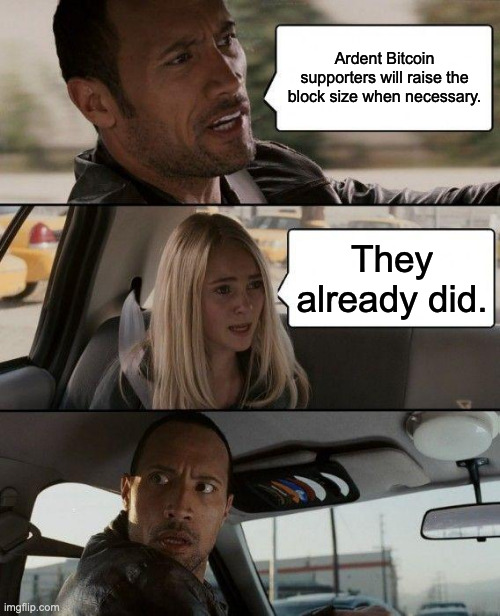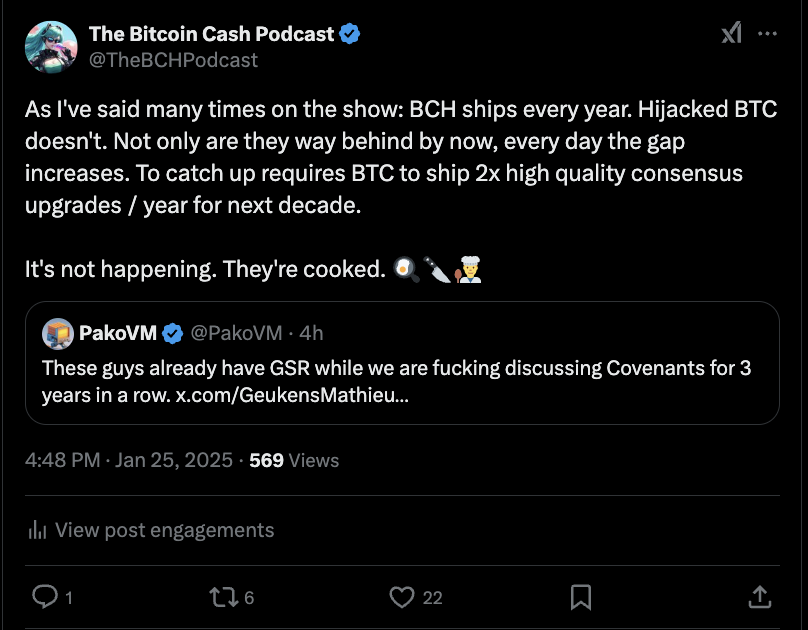If BCH improved on BTC by raising the 1MB block size limit, what if BTC does the same?
They won't.

They called it Bitcoin Cash. Original source
By definition, everyone who supported raising the block size left the BTC community (some to BCH, some elsewhere) after BTC refused to cooperate on it. The remaining BTC individuals, unswayed by years of passionate debate, were totally steadfast that raising the block size should never be an option, and they actively rooted out and censored any dissenting voices. Since then, new BTC community members have only been told one side of the story, and are even less likely to be interested in a block size increase.
"But they DID increase the blocksize!!" is a red herring piece of propaganda.
Network Effect Of Ideas
Expecting a(n eventual) blocksize increase in BTC is kind of like thinking "French and Spanish are pretty similar, what if the entire population of France suddenly decided to start speaking Spanish? Couldn't they just overtake Spain?" The vast majority of Spanish speakers are in Spain, all the most influential people involved are Spanish, all the best Spanish language schools are in Spain already, every day more young Spanish speakers are taught Spanish in Spain, all of the Spanish road signs & restaurant menus & government documents & company business plans and everything else are already in Spanish, and any individual Frenchman who decided to switch from French to Spanish would be better off moving himself to Spain than trying to convince the rest of France. There would be no way to coordinate the entirety of France to simultaneously drop French and switch to speaking Spanish. The reverse is also true for a Spaniard who thought French was a superior language, he should relocate to France as changing the rest of Spain to his individual preference would be impossible.
In the same way, the network effect of Bitcoiners who think big blocks is a good idea is already entrenched in BCH, and the network effect of Bitcoiners who DON'T want big blocks is already entrenched in BTC. The same is true of all the network, technical & community infrastructure - software for miners, developer libraries, the way wallets work, the onboarding strategies & messaging to end users and so on.
The BTC community does not have an agreed governance process. They believe it would be a centralised point of attack. So not only does (virtually) no-one in the BTC community want a blocksize increase, there is also no recognised process for advocating or agreeing on one. This problem has become so bad it has now been lampooned by the BTC Taproot Wizards.
The BCH community has the CHIP process for discussing protocol updates but never needs to discuss blocksize increases anyway thanks to ABLA.
Roadblocks to raising blocksize
If there was ever a question of raising the limit on the BTC side, the heretical thinker would be cast out and find it easier to switch to Bitcoin Cash than to convince an entire community zealously against the idea. Even if a substantial minority liked the idea, their ideas could only lead to the same hostile chainsplit outcome (and chaos in the BTC community) as BCH has already been through. This involves at minimum:
- Years of pre-fork debate, consternation and stalled community progress.
- Unwinding widespread propaganda such as hard forks are bad and 1 MB blocks are needed to "increase creativity".
- Gathering significant support among the notoriously busy & distracted miners.
- Possible failure to launch an upgraded fork. A hostile chain split is a chaotic and risky last-resort exercise, with a very uncertain chance of surviving at all.
- Possible further splits among competing camps within the renegades after a fork is successfully launched (as BCH had with BSV and XEC).
- A need to coalesce on a new brand and governance structure.
- Further technical changes to facilitate competing as an independent Bitcoin fork e.g. a new address format, modifications to difficulty adjustment algorithm, replay protection implementation etc.
- Years of downward price pressure from 1MB believers dumping their coins.
- Fracturing network effect for BTC based businesses, exchange liquidity, software projects, community forums etc.
- Deliberate disruption from 1MB supporters and business models that rely on no blocksize increase (e.g. the Lightning network ecosystem).
- Creation & slow-to-build traction of new community discussion hubs, podcasts, forums & in-person meetups.
- Enormous confusion by existing BTC holders who may or may not be aware of or involved in the fork crisis.
- Unwinding or rethinking BTC technical "improvements" such as SegWit or Taproot which the BCH community have wisely avoided.
- A minimum of several years operation to build confidence in the project's resiliency.
BCH is already many years ahead of passing through this entire gauntlet, and any theoretical new fork has yet to start it. Years of debate plus years of post-fork chaos is time that BCH would continue to forge even further ahead uninterrupted. No one in the BTC camp is convinced of raising the limit, and if they change their minds it's far, far easier to change sides and join the existing BCH momentum than start again.
Prominent influencers in the BTC scene all believe firmly and publicly in the 1MB approach, and if they change their tune it would be a huge credibility and reputational loss and immediately reignite discussion that perhaps BCH has been right all along.
... But what if they did

No way to catch a marathon runner with a huge lead unless you can massively & sustainably outpace them. GSR = "Great Script Restoration", which is the less-elegant & less-refined BTC equivalent of the VM Limits "Velma" BCH 2025 upgrade. Original source
Even in the very, very unlikely scenario that BTC did agree to raise the blocksize limit (perhaps due to a surging BCH) without a calamitous meltdown, that only gets them to the point BCH was at 1st August 2017. BTC & BCH are now very different. Since then, BCH has been building further and further ahead, and BTC has a long way to catch up. Note that once again, all of the people most committed to & skilled with these concepts are already in the BCH community & the BTC community has a huge uncompetitive deficit of these skillsets for the same reasons.
- Scaling: Scaling via blocksize is more straightforward than building a Lightning Network, but it still requires a lot of work on optimising node software, supporting infrastructure, mining optimisations and network capacity planning.
- Tech: BCH kept developing after the split. AnyHedge, CashTokens, Flipstarter and other innovations took years of work for the community to research, develop, debate and coordinate into production. BTC of course has not started this process of upgrading their chain, instead they've made things worse with changes like SegWit and Taproot leading to the Ordinals mess.
- Tooling: Everything around the BCH scaling and tech is another big layer of hard work: community buy-in, developer tools and libraries. Scaling and tech require work above and beyond the protocol level, and that work isn't quick or cheap to coordinate in a decentralised ecosystem.
Finally, raising the block size limit does not fix the underlying social problem of BTC, that it has a single developer team (Bitcoin Core) who have dictatorial control over the protocol development. Soon enough, another issue would occur where that central point of control proved a critical weakness either intentionally or unintentionally. Bitcoin Cash has already fixed this problem, with proven ability to reject development teams if necessary, as seen with the fork from BTC and later the fork from XEC (eCash).
As of May 2025, this problem of social control with Bitcoin Core has already re-occured with the OP_RETURN "spam" issue, as predicted by this FAQ article. For more about that, see Episode 151: Bitcoin Mechanic & The Architects of Spam.
Note on Reverse Argument
Note, this argument is also sometimes posed in reverse - not that BTC can easily copy BCH, but that BCH will unwittingly fall prey to the same difficulties as BTC. This is also nonsense, see Will BCH inevitably run into the same problems as it grows to BTC size?.
See also: Should (or will) Bitcoin Cash rebrand?